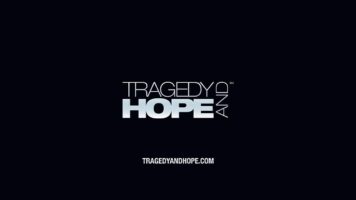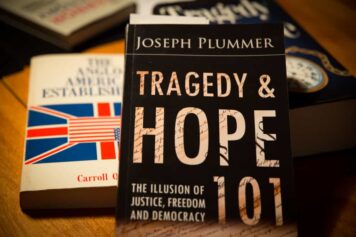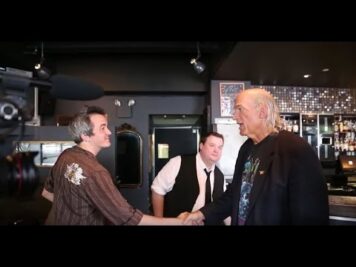The science of mind control and how we learn to love our own slavery: Richard Grove on State of Mind
Author: Lisa Arbercheski•January 13, 2014
Tags:advertising, Bernays, cia, control, craig, education, grove, huxley, mckee, media, mind, mkultra, of, psychology, reliance, richard, science, self, skinner, state
It’s one thing to be controlled through force. Force is visible and its implications are evident: go against those in power and you could be ostracized, imprisoned, or killed.
But according to filmmaker and forensic historian Richard Grove, a co-writer of the recently released documentary State of Mind: The Psychology of Control, there is a more insidious form of control at work in our society, one that powerful elites have employed throughout history without most of us even realizing it. The target of this form of control is our minds. And what is under siege is our ability and willingness to think critically, to challenge what we are told, and to resist efforts to manipulate and deceive us.
“They play on your emotions, your inability to think your way out,” Grove said in an interview.
“People use words to trick other people, and that’s what I’ve seen through history. They’ve basically taken away the components of intellectual self-defense and compassionate communication, and that puts everyone at odds and starts the divide and conquer. And that’s their game.”
State of Mind chronicles the history and science of mind control, from Plato and Macchiavelli to Edward Bernays and B.F. Skinner: from eugenics and Darwinism to the Tavistock Insititute, Operation Paperclip, and MK-Ultra. The film examines how advertising, education, pharmaceutical drugs, consumerism, and the mass media are key elements of both mind control and psychological warfare, particularly over the past two centuries.
“Everybody’s born into this control structure, everybody’s born into authority,” Grove says in the film. “But just because you have an authority making decisions for you at some point when you’re too young to take care of yourself doesn’t mean you should always cater to authority your whole life.”
And then this comment from the voice-over in the film about how the education and advertising are used to keep the population “dumbed down”:
“Advertising, in addition to fundamental changes in education, produced a population of non-thinkers whose false understanding of basic concepts instilled through public schooling led to generations of people who feel they are magically endowed with the ability to somehow attain knowledge without first observing the landscape of available, credible evidence.”
(The italics above are mine: this portion of the quote, I would suggest, can also be applied to those who ridicule “conspiracy theorists” despite not having any evidence upon which to base their disdain.)
Grove, the man behind the Tragedy and Hope history podcasts, says in the film that one key difference between humans and animals is that we have the ability to ask questions, and this difference allows us to escape some types of control. But we have to be willing to ask those questions if we ever hope to find answers and to be truly free.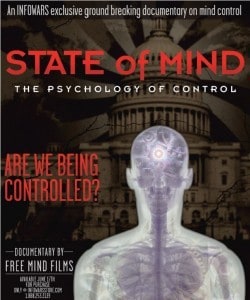
“The greatest barrier to discovery is not ignorance,” Grove says in the film, “it’s the illusion of knowledge.”
We hear from a number of influential thinkers in State of Mind, including Brave New World author Aldous Huxley. In a 1950s TV interview shown in the film, Huxley says:
“If you want to preserve your power indefinitely you have to get the consent of the ruled. And this they will do partly by drugs, as I foresaw in Brave New World, and partly by these new techniques of propaganda. They’ll do it by bypassing the sort of rational side of man by appealing to his subconscious and his deeper emotions and his physiology even, and so making him love his slavery, actually. I think this is the danger, that people may be actually happy under the new regime. But they’ll be happy in situations when they oughtn’t to be happy.”
So not only are we largely unaware of the system of control that takes our humanity away, but the very nature of that control has us thinking we are happy – in effect embracing our slavery.
False flags: tools of manipulation
One of the key elements of modern mind control is the misdirection of the false flag operation. With events like 9/11, we are all tricked into thinking we are constantly under an external threat rather than seeing how the mechanisms of power are truly operating against us.
“The false flag operation is equivalent to a magician’s use of a wand: look over here while something else goes on over there,” Grove says. “If 9/11 is a type of magic show, which all psychological warfare operations are … they know that they can misdirect people’s attention through belief, through propaganda, through people not checking their premises – that’s psychological warfare in action.”
Grove had been working on the 96th floor of the World Trade Center just two weeks before 9/11. His examination of that event (he created the podcast 9/11 Synchronicity) led him to realize that a large scale deception had taken place, particularly because of financial irregularities that pointed to some firms having foreknowledge of the event.
While State of Mind does not address 9/11 in any detail, it is referred to in the context of Georg Wilhelm Friedrich Hegel and the Hegelian dialectic: problem, reaction, solution. In the film’s voice over:
“The ruling class creates an artificial crisis to which the population reacts by begging for the ruling class to intervene. The ruling class then enjoys the plunder made possible from the removal of the self-reliance from individuals.”
In other words, 9/11 was perpetrated for the purpose of creating terror and misdirection so that those in power could then impose a solution that would be welcomed by the population: the war on terror and a systematic reduction of civil liberties.
I asked Grove about the problem of truth seekers who become split over events like the Boston Marathon bombing or the Sandy Hook school shooting. In other words, some are willing to go farther down the rabbit hole than others.
“I think a lot of these events are scripted psychologically to bring out the patriots to see how they react,” he says. “It’s like velociraptors testing the fences in Jurassic Park; they’re playing with us right now. “It’s the complexity of cinema. The more layers, the more fantastical it is. And they just add a bunch of layers, and a lot of their layers are artificial noise. And the struggle becomes how do you discern the signal and discard the noise?”
So, how can productive discussions take place between those who disagree about one event or another – or between those who are open-minded about conspiracies in general and those who are not?
“Before I would have a conversation in an optimal utopic world that doesn’t exist, I would say let’s go by this table of evidence and look at each thing together – and see what we see together.
“You have to build that bridge of communication before you can send the logic across it.”
The writing of State of Mind
Grove was originally brought on board to be an interview subject in the film, but he was later asked by the producers to bring together about 40 hours worth of interviews. He says that he came up with several versions of the film (6 hours, 3 hours, 90 minutes), adding that what he calls the “writer’s cut” of the film does not have much overlap with what ended up being in the final version.
“There’s a lot of emphasis on the MK Ultra program, and that’s their preference,” he says. “That basically seeded the movie for them to get started, so we had to respect that.
“In our version of it, in the writers’ version of it, [the surveillance state] is very much a mainstay: the technocracy, the evolution of cybernetics into controlling human resources and being rained down through the smart grid and smart devices and basically creating an electronic gulag.”
Grove says it is a fact of history that elite groups have used their knowledge of the mind to oppress people rather than to help them. But he adds that we cannot let this knowledge discourage us.
“This is the nature of human beings, that some people are trying control other people and to plunder other people, and it’s just a fact of life,” he says. “We don’t need to get upset about it, but we do need to protect ourselves against it. We do need to be able to validate the contents of our minds and to tell fact from fiction.”
The increasing role of technology is an element of the science of mind control that can’t be ignored – although Grove says that technology itself is not the problem. He says the Nazis were working towards total control of the population through, among other things, the accumulation of information, but they lacked the computing power to fully consolidate this kind of control.
Today, we have the Internet, which can be used for the free exchange of information but also for those in power to collect data for the purpose of control.
“The Internet’s a tool; it can be used for good or evil,” Grove says. “And evil is what happens when it’s a stimulus/response world, because then we all act like animals. The difference between humans and animals is that we have the ability to fill that space with thinking and using reason and logic, and we have the ability to be compassionate and communicate our needs instead of using violence.”
He says that a battle has been raging throughout history between those who want to suppress consciousness and those who want to express it.
“There’s all this great information that proves all these conspiracies, and we don’t have to live this lie anymore, but there’s these other people who say, “It’s too much work, I like the lie, let me have the steak (a reference to The Matrix).
“But the steak’s not real.”
Grove says that without the willingness to think critically, we lose the ability to be free and creative individuals, which is essential to our humanity.
“Yes, it’s work because it takes up time and it takes energy, but I call it life, because this is the work of living and not being a dead, soulless person out there being part of the problem like an agent in The Matrix.
“Nature’s pretty cool when it all gets in synchronization, but to do that you have to turn your mind on and start asking questions about what is being taught here in this curriculum we call life.”
State of Mind: The Psychology of Control (2013) is a production of Free Mind Films. It was directed by James Lane; produced by Austin Green, James Lane, and Christopher Emery; and written by Richard Grove, Kevin Cole, and Matthew Hart. It features interviews with Alex Jones, Jon Rappoport, G. Edward Griffin, and others. You can purchase a copy of the film from infowars.com. 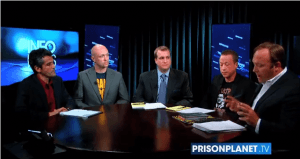
Some notable comments from the interviewees in State of Mind
- “If large numbers of people don’t become consciously resistant to the overall mind control exerted on society we’re going to see many more people who really do resemble androids. People induce this themselves by looking out at the world and saying, ‘It’s too dangerous for me to tell the truth or to say what I really believe or to express how I really feel; it’s much better if I fabricate an entire synthetic personality that’s going to sit back here and remain passive.’” – Investigate journalist Jon Rappoport
- “If you’re a radical, you’re less likely to be loved. You’re not fitting in with society, you’re an outsider. There are a lot of social prohibitions for the outsider and the one who’s going to upset things.” – Doug Valentine, author of The Phoenix Program.
- “The consequences of non-resistance to control is losing everything that makes us human, that we love, that we cherish. This is all happening so fast. You have to be ahead of the game; they’re ahead of the game.” “– Kaye Beach, radio host.
- “Humans subjugate themselves to control because they’re born into it. The tyrants and the social engineers know how to incrementally begin to slowly ratchet up the manipulation, the domination, the oppression, so that people never really recognize it coming.” – Alex Jones, Infowars.
- “The idea of short-term gain, basically giving up freedoms is never a good idea.” – Anthony Schaeffer, former intelligence officer.
- “The real goal was to change America from an individualist system to a collectivist system, in which case it could be merged with the rest of the world, and there would be the great New World Order we hear so much about in recent years. – G. Edward Griffiin, author of The Creature of Jekyll Island.
- “Billions and billions and billions of dollars have been spent privately and publicly looking at how to tap into your psyche, how to cause you to make choices you wouldn’t otherwise make, to do things you wouldn’t otherwise do, to consume whether it is a product or a plank in a political platform.” – Dr. Eldon Taylor, psychotherapist and motivational speaker.
- “Information and knowledge equals power and control.” – Dr. Colin Ross, psychiatrist and author of The CIA Doctors.
- “A lot of folks who are critical thinkers they realize how powerful this kind of great giant corporate government entity is out there, and that kind of understanding that a critical thinker has can be quite painful and can lead to them becoming depressed and apathetic and giving up.” – Dr. Bruce Levine, psychologist, author of Get Up, Stand Up.
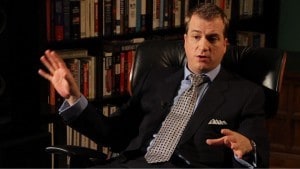 January 13, 2014
January 13, 2014
By Craig McKee
It’s one thing to be controlled through force. Force is visible and its implications are evident: go against those in power and you could be ostracized, imprisoned, or killed.
But according to filmmaker and forensic historian Richard Grove, a co-writer of the recently released documentary State of Mind: The Psychology of Control, there is a more insidious form of control at work in our society, one that powerful elites have employed throughout history without most of us even realizing it. The target of this form of control is our minds. And what is under siege is our ability and willingness to think critically, to challenge what we are told, and to resist efforts to manipulate and deceive us.
“They play on your emotions, your inability to think your way out,” Grove said in an interview.
“People use words to trick other people, and that’s what I’ve seen through history. They’ve basically taken away the components of intellectual self-defense and compassionate communication, and that puts everyone at odds and starts the divide and conquer. And that’s their game.”
State of Mind chronicles the history and science of mind control, from Plato and Macchiavelli to Edward Bernays and B.F. Skinner: from eugenics and Darwinism to the Tavistock Insititute, Operation Paperclip, and MK-Ultra. The film examines how advertising, education, pharmaceutical drugs, consumerism, and the mass media are key elements of both mind control and psychological warfare, particularly over the past two centuries.
“Everybody’s born into this control structure, everybody’s born into authority,” Grove says in the film. “But just because you have an authority making decisions for you at some point when you’re too young to take care of yourself doesn’t mean you should always cater to authority your whole life.”
And then this comment from the voice-over in the film about how the education and advertising are used to keep the population “dumbed down”:
“Advertising, in addition to fundamental changes in education, produced a population of non-thinkers whose false understanding of basic concepts instilled through public schooling led to generations of people who feel they are magically endowed with the ability to somehow attain knowledge without first observing the landscape of available, credible evidence.”
(The italics above are mine: this portion of the quote, I would suggest, can also be applied to those who ridicule “conspiracy theorists” despite not having any evidence upon which to base their disdain.)
Grove, the man behind the Tragedy and Hope history podcasts, says in the film that one key difference between humans and animals is that we have the ability to ask questions, and this difference allows us to escape some types of control. But we have to be willing to ask those questions if we ever hope to find answers and to be truly free. 
“The greatest barrier to discovery is not ignorance,” Grove says in the film, “it’s the illusion of knowledge.”
We hear from a number of influential thinkers in State of Mind, including Brave New World author Aldous Huxley. In a 1950s TV interview shown in the film, Huxley says:
“If you want to preserve your power indefinitely you have to get the consent of the ruled. And this they will do partly by drugs, as I foresaw in Brave New World, and partly by these new techniques of propaganda. They’ll do it by bypassing the sort of rational side of man by appealing to his subconscious and his deeper emotions and his physiology even, and so making him love his slavery, actually. I think this is the danger, that people may be actually happy under the new regime. But they’ll be happy in situations when they oughtn’t to be happy.”
So not only are we largely unaware of the system of control that takes our humanity away, but the very nature of that control has us thinking we are happy – in effect embracing our slavery.
False flags: tools of manipulation
One of the key elements of modern mind control is the misdirection of the false flag operation. With events like 9/11, we are all tricked into thinking we are constantly under an external threat rather than seeing how the mechanisms of power are truly operating against us.
“The false flag operation is equivalent to a magician’s use of a wand: look over here while something else goes on over there,” Grove says. “If 9/11 is a type of magic show, which all psychological warfare operations are … they know that they can misdirect people’s attention through belief, through propaganda, through people not checking their premises – that’s psychological warfare in action.”
Grove had been working on the 96th floor of the World Trade Center just two weeks before 9/11. His examination of that event (he created the podcast 9/11 Synchronicity) led him to realize that a large scale deception had taken place, particularly because of financial irregularities that pointed to some firms having foreknowledge of the event.
While State of Mind does not address 9/11 in any detail, it is referred to in the context of Georg Wilhelm Friedrich Hegel and the Hegelian dialectic: problem, reaction, solution. In the film’s voice over:
“The ruling class creates an artificial crisis to which the population reacts by begging for the ruling class to intervene. The ruling class then enjoys the plunder made possible from the removal of the self-reliance from individuals.”
In other words, 9/11 was perpetrated for the purpose of creating terror and misdirection so that those in power could then impose a solution that would be welcomed by the population: the war on terror and a systematic reduction of civil liberties.
I asked Grove about the problem of truth seekers who become split over events like the Boston Marathon bombing or the Sandy Hook school shooting. In other words, some are willing to go farther down the rabbit hole than others.
“I think a lot of these events are scripted psychologically to bring out the patriots to see how they react,” he says. “It’s like velociraptors testing the fences in Jurassic Park; they’re playing with us right now. “It’s the complexity of cinema. The more layers, the more fantastical it is. And they just add a bunch of layers, and a lot of their layers are artificial noise. And the struggle becomes how do you discern the signal and discard the noise?”
So, how can productive discussions take place between those who disagree about one event or another – or between those who are open-minded about conspiracies in general and those who are not?
“Before I would have a conversation in an optimal utopic world that doesn’t exist, I would say let’s go by this table of evidence and look at each thing together – and see what we see together.
“You have to build that bridge of communication before you can send the logic across it.”
The writing of State of Mind
Grove was originally brought on board to be an interview subject in the film, but he was later asked by the producers to bring together about 40 hours worth of interviews. He says that he came up with several versions of the film (6 hours, 3 hours, 90 minutes), adding that what he calls the “writer’s cut” of the film does not have much overlap with what ended up being in the final version.
“There’s a lot of emphasis on the MK Ultra program, and that’s their preference,” he says. “That basically seeded the movie for them to get started, so we had to respect that.
“In our version of it, in the writers’ version of it, [the surveillance state] is very much a mainstay: the technocracy, the evolution of cybernetics into controlling human resources and being rained down through the smart grid and smart devices and basically creating an electronic gulag.”
Grove says it is a fact of history that elite groups have used their knowledge of the mind to oppress people rather than to help them. But he adds that we cannot let this knowledge discourage us.
“This is the nature of human beings, that some people are trying control other people and to plunder other people, and it’s just a fact of life,” he says. “We don’t need to get upset about it, but we do need to protect ourselves against it. We do need to be able to validate the contents of our minds and to tell fact from fiction.”
The increasing role of technology is an element of the science of mind control that can’t be ignored – although Grove says that technology itself is not the problem. He says the Nazis were working towards total control of the population through, among other things, the accumulation of information, but they lacked the computing power to fully consolidate this kind of control.
Today, we have the Internet, which can be used for the free exchange of information but also for those in power to collect data for the purpose of control.
“The Internet’s a tool; it can be used for good or evil,” Grove says. “And evil is what happens when it’s a stimulus/response world, because then we all act like animals. The difference between humans and animals is that we have the ability to fill that space with thinking and using reason and logic, and we have the ability to be compassionate and communicate our needs instead of using violence.”
He says that a battle has been raging throughout history between those who want to suppress consciousness and those who want to express it.
“There’s all this great information that proves all these conspiracies, and we don’t have to live this lie anymore, but there’s these other people who say, “It’s too much work, I like the lie, let me have the steak (a reference to The Matrix).
“But the steak’s not real.”
Grove says that without the willingness to think critically, we lose the ability to be free and creative individuals, which is essential to our humanity.
“Yes, it’s work because it takes up time and it takes energy, but I call it life, because this is the work of living and not being a dead, soulless person out there being part of the problem like an agent in The Matrix.
“Nature’s pretty cool when it all gets in synchronization, but to do that you have to turn your mind on and start asking questions about what is being taught here in this curriculum we call life.”
State of Mind: The Psychology of Control (2013) is a production of Free Mind Films. It was directed by James Lane; produced by Austin Green, James Lane, and Christopher Emery; and written by Richard Grove, Kevin Cole, and Matthew Hart. It features interviews with Alex Jones, Jon Rappoport, G. Edward Griffin, and others. You can purchase a copy of the film from infowars.com. 
Some notable comments from the interviewees in State of Mind
- “If large numbers of people don’t become consciously resistant to the overall mind control exerted on society we’re going to see many more people who really do resemble androids. People induce this themselves by looking out at the world and saying, ‘It’s too dangerous for me to tell the truth or to say what I really believe or to express how I really feel; it’s much better if I fabricate an entire synthetic personality that’s going to sit back here and remain passive.’” – Investigate journalist Jon Rappoport
- “If you’re a radical, you’re less likely to be loved. You’re not fitting in with society, you’re an outsider. There are a lot of social prohibitions for the outsider and the one who’s going to upset things.” – Doug Valentine, author of The Phoenix Program.
- “The consequences of non-resistance to control is losing everything that makes us human, that we love, that we cherish. This is all happening so fast. You have to be ahead of the game; they’re ahead of the game.” “– Kaye Beach, radio host.
- “Humans subjugate themselves to control because they’re born into it. The tyrants and the social engineers know how to incrementally begin to slowly ratchet up the manipulation, the domination, the oppression, so that people never really recognize it coming.” – Alex Jones, Infowars.
- “The idea of short-term gain, basically giving up freedoms is never a good idea.” – Anthony Schaeffer, former intelligence officer.
- “The real goal was to change America from an individualist system to a collectivist system, in which case it could be merged with the rest of the world, and there would be the great New World Order we hear so much about in recent years. – G. Edward Griffiin, author of The Creature of Jekyll Island.
- “Billions and billions and billions of dollars have been spent privately and publicly looking at how to tap into your psyche, how to cause you to make choices you wouldn’t otherwise make, to do things you wouldn’t otherwise do, to consume whether it is a product or a plank in a political platform.” – Dr. Eldon Taylor, psychotherapist and motivational speaker.
- “Information and knowledge equals power and control.” – Dr. Colin Ross, psychiatrist and author of The CIA Doctors.
- “A lot of folks who are critical thinkers they realize how powerful this kind of great giant corporate government entity is out there, and that kind of understanding that a critical thinker has can be quite painful and can lead to them becoming depressed and apathetic and giving up.” – Dr. Bruce Levine, psychologist, author of Get Up, Stand Up.











